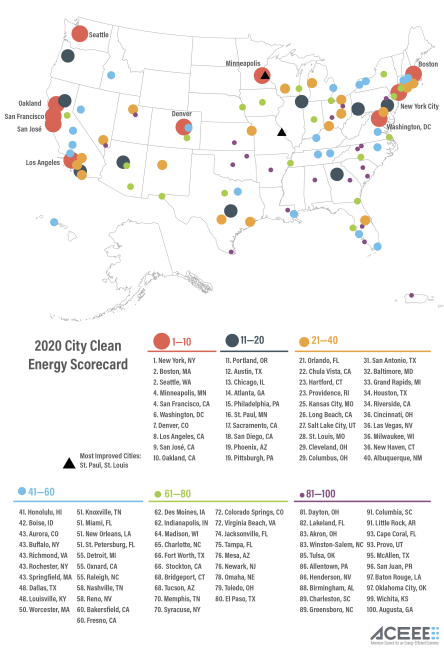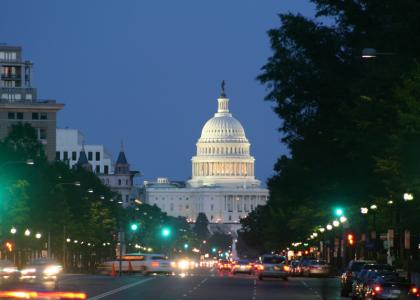The fifth ACEEE City Clean Energy Scorecard measures the progress of city policies and programs that save energy, encourage renewable energy, and reduce greenhouse gas emissions while also focusing on equity in development and delivery. We rank 100 large U.S. cities for their energy efficiency and renewable energy efforts across 5 policy areas: local government operations, community-wide initiatives, buildings, energy and water utilities, and transportation. In this year's results, New York earns the top spot in the rankings for the first time. Joining New York at the top are Boston and Seattle (tied for second) and Minneapolis and San Francisco (tied for fourth). St. Paul and St. Louis are the most-improved since the 2019 City Scorecard. Overall, we found that many cities continue to ramp up their clean energy efforts, but bottom-scoring cities are years behind the policy efforts of the leaders. The Scorecard provides a roadmap for cities aiming to take the next step in their pursuit of clean energy by learning from others’ successes and adapting best practices to suit their own communities.
Download the Report
| Suggested Citation |
| Ribeiro, D., S. Samarripas, K. Tanabe, A. Jarrah, H. Bastian, A. Drehobl, S. Vaidyanathan, E. Cooper, B. Jennings, and N. Henner. 2020. The 2020 City Clean Energy Scorecard. Washington, DC: American Council for an Energy-Efficient Economy. www.aceee.org/local-policy/city-scorecard. |
The 2020 City Clean Energy Scorecard analyzes the efforts of 100 major U.S. cities to make buildings and transportation more energy efficient and scale up the use of renewable energy. It provides the most comprehensive national measuring stick for climate progress and a roadmap for future improvements.
The Scorecard finds that leading cities are expanding their clean energy efforts to tackle climate change, while others lag far behind. One-fifth of those examined have community-wide greenhouse gas reductions goals and are on track to meet them.
Highlights of each city’s progress are included in the fact sheets linked below, drawn from the report. To find extended details on each city’s clean energy efforts, visit our state and local policy database.
View the Fact Sheets
City Fact Sheets
• Akron • Albuquerque • Allentown • Atlanta • Augusta • Aurora • Austin •
• Bakersfield • Baltimore • Baton Rouge • Birmingham • Boise • Boston • Bridgeport • Buffalo •
• Cape Coral • Charleston • Charlotte • Chicago • Chula Vista • Cincinnati • Cleveland • Colorado Springs • Columbia • Columbus •
• Dallas • Dayton • Denver • Des Moines • Detroit •
• El Paso •
• Fort Worth • Fresno •
• Grand Rapids • Greensboro •
• Hartford • Henderson • Honolulu • Houston •
• Indianapolis •
• Jacksonville •
• Kansas City • Knoxville •
• Lakeland • Las Vegas • Little Rock • Long Beach • Los Angeles • Louisville •
• Madison • McAllen • Memphis • Mesa • Miami • Milwaukee • Minneapolis •
• Nashville • Newark • New Haven • New Orleans • New York City •
• Oakland • Oklahoma City • Omaha • Orlando • Oxnard •
• Philadelphia • Phoenix • Pittsburgh • Portland • Providence • Provo •
• Raleigh • Reno • Richmond • Riverside • Rochester •
• Sacramento • Salt Lake City • San Antonio • San Diego • San Francisco • San José • San Juan • Seattle • Springfield • St. Louis • Stockton • St. Paul • St. Petersburg • Syracuse •
• Tampa • Toledo • Tucson • Tulsa •
• Virginia Beach •
• Washington, DC • Wichita • Winston-Salem • Worcester •













